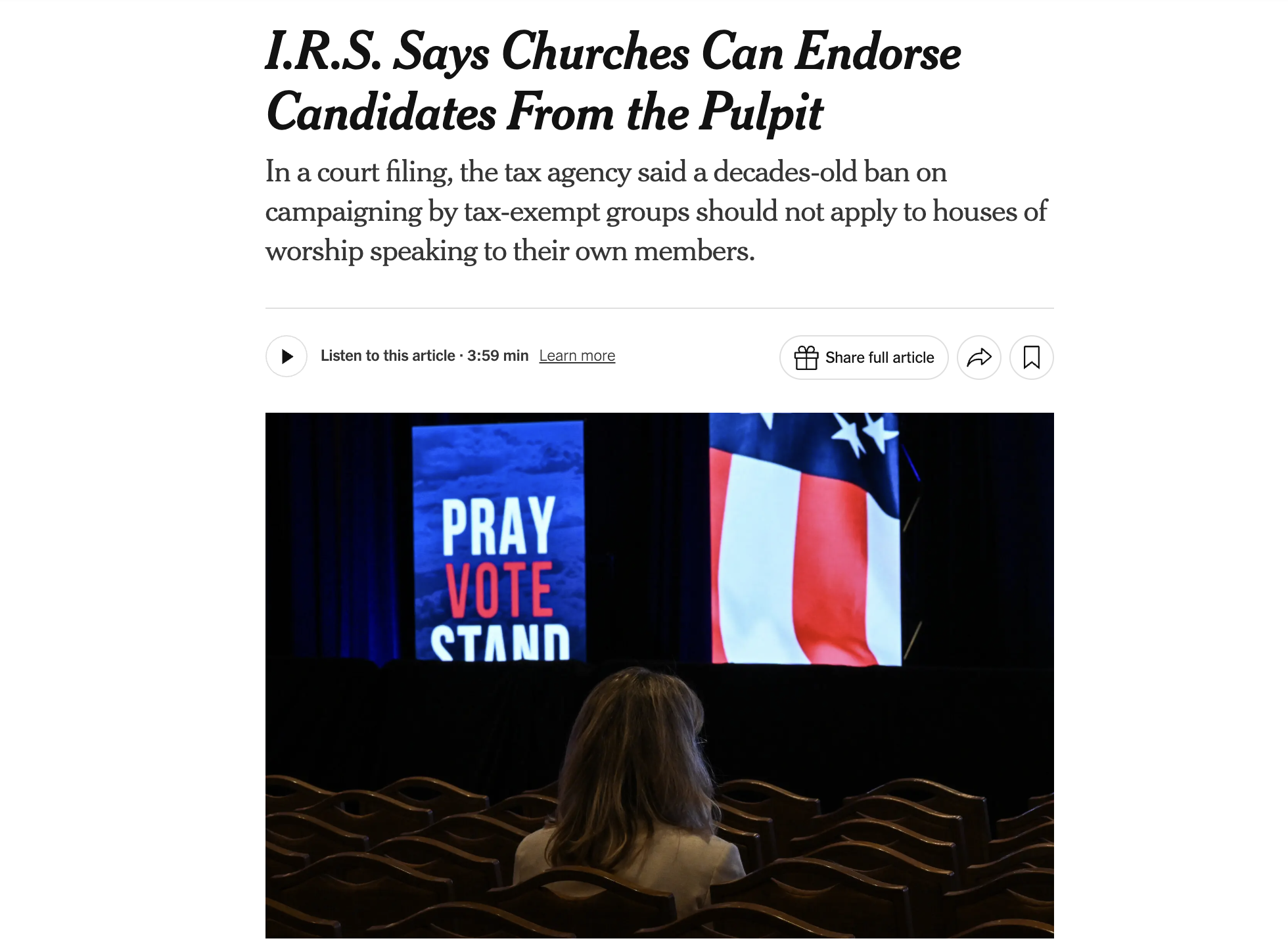In a Win for Religious Liberty, the IRS Agrees to Stop Using the Johnson Amendment to Threaten the Free Speech of American Churches
Late on Monday evening, July 7, The New York Times reported that the Internal Revenue Service (IRS) officially acknowledged “that churches and other houses of worship can endorse political candidates to their congregations.” The change marks a significant shift, replacing a decades-old blanket ban on “political” activity by tax-exempt nonprofits.
While this is a major victory for religious freedom and free speech for every church in America, it was won by the hard work of two churches and two parachurch ministries. Sand Springs Church (Athens, TX) and First Baptist Church Waskom (Waskom, TX) joined with the National Religious Broadcasters Association and Intercessors for America. Together, they asked a federal judge to end IRS intimidation of America’s pulpits via the so-called “Johnson Amendment.”
When they first announced their joint lawsuit in August 2024, NRB President & CEO Troy A. Miller said: “For too long, churches have been instructed to remain silent on pressing matters of conscience and conviction during election season or risk their 501(c)(3) status. We believe that all nonprofits should have the constitutional right to freely express their point of view on candidates, elections, and issues on the ballot. Our challenge to the Johnson Amendment is about securing the future of free expression for all Americans, particularly those standing in the pulpit.”
And NRB general counsel Michael Farris added that “The Johnson Amendment has long been applied in a discriminatory manner that respects the First Amendment freedoms of some, but not of others. Our intent is to vindicate the right of every church and religious nonprofit to express what their faith teaches on every issue, including political matters, as is their right and their duty.”
Since 1954, the Johnson Amendment has threatened to yank churches’ tax exemptions if they “participate in or intervene in” a political campaign on behalf of candidates. This vague language had a chilling effect on conservative pastors (in particular), who feared that mentioning candidates or policies in sermons could draw IRS scrutiny. Meanwhile, many left-leaning churches seemed to ignore the rule without consequence.
As the NRB noted in their press release, the IRS’s enforcement was arbitrary and capricious, at best. It showed a partisan history of IRS enforcement that disfavored conservative religious groups. Pulpit speech at least deserves equal treatment. The IRS’s history of unequal enforcement managed to violate the First Amendment’s religion clauses and the Fifth Amendment’s equal protection clause.
Now, thanks to the courage of these Christians in court, this muzzle on the prophetic, evangelical pastors in America has been removed. Churches have been unchained to apply the whole counsel of God to every aspect of our lives. This includes discussing political issues and even candidates, without fear of politically motivated retribution from the federal government. Under the proposed “consent” judgment, the IRS agrees it will not use the Johnson Amendment to punish speech from America’s pulpits.
Under the agreed-upon interpretation, when a church addresses its congregation during religious services, through customary channels, about electoral politics viewed through the lens of faith, it will no longer be considered “participating in or intervening in” a political campaign.
This is only right. After all, a pastor who preaches on how biblical principles apply to candidates is not acting as a political operative. He is acting as a shepherd, guiding his flock to apply biblical principles faithfully to all of life.
American Christians of all denominations owe a debt of gratitude to these two churches for standing firm. Thanks also go to NRB CEO Troy Miller, attorney Mike Farris, and Intercessors for America for protecting First Amendment freedom for churches and pastors. Southern Baptists, with our long heritage of support for religious liberty and First Amendment freedoms, should be especially glad to see Caesar’s imposition removed from our pulpits.
To be clear, this ruling does not turn churches into political action committees. Churches must remain churches. Direct endorsements published outside worship, campaign contributions, coordinated political ads, and external campaign activities may be considered by the IRS. But faith-based communications within religious services—such as sermons, teachings, and gatherings where Scripture addresses public life—are not “participation” in a politician’s campaign.
For pastors, this is both an encouragement and a call to courage. Many pulpits have been silenced unnecessarily. Just last year, some Missouri Christians told me they thought the Johnson Amendment barred them from speaking about state constitutional amendments on abortion. In reality, the amendment never barred Christians from participating in the legislative process. The IRS’s fuzzy language, however, chilled speech on many issues. Praise God, pastors should now feel free to speak up.
Southern Baptist pastor and North Carolina Congressman Mark Harris highlighted the “fear factor” of the Johnson Amendment when he joined a bicameral group of lawmakers in introducing the “Free Speech Fairness Act.” This legislation aims to ensure that religious entities can apply biblical teachings to all areas of life without fear of IRS investigation and fines. When announcing his legislation, Rep. Harris clarified that “People of faith should not fear exercising their First Amendment rights at the risk of the IRS.” Amen!
Two days after the court order was announced, Rep. Harris joined Tony Perkins on Washington Watch and called on Republicans in Congress to seize the “momentum” and put a permanent end to the IRS’s ability to silence pastors, pulpits, churches, and nonprofits.
Rep. Harris is right. While this consent judgment is a step in the right direction, there is more to be done. The Johnson Amendment’s application to churches is an outlier in our Anglo-Saxon legal tradition. In 1215, the Magna Carta guaranteed the Church would be “free” with “all its rights fully and its liberties entirely.” Our First Amendment goes even further, protecting individual believers in their Free Exercise of religion.
Against this backdrop, the Johnson Amendment was an aberration, rooted in the misconception that the government can compel silence from churches because they are tax-exempt. However, tax exemption for churches is not a “deal,” but rather an acknowledgment that churches’ liberty comes from God. Churches should be free from government interference.
While some pastors and nonprofit leaders may have held their tongue under the previous regime out of fear, I fear that other Christians have used the Johnson Amendment as an excuse to avoid hard moral teaching. Brothers, this should not be. Scripture calls pastors to equip their people for every good work, including their role as citizens.
Regardless of what the government says we can or cannot say, Christ remains our ultimate authority. Pulpits should speak weighty, gospel truth without needless division. Yet, many political issues today are in fact biblical issues. Pastors and churches—not the IRS—should decide what needs to be said.
Unfortunately, the Johnson Amendment created another bad habit: Justifying government intrusion as some kind of “Christian principle.” Even some Southern Baptist leaders will reflexively say the tax man’s rule just stopped churches from doing the wrong thing. “Churches should talk about political issues so clearly, they don’t need to endorse candidates anyway,” they say.
I disagree. The biblical line was never an “endorsement,” and the government shouldn’t define a line for churches. The weight of the Scripture should drive sermons, not the glare of the IRS.
As I said on X, “Churches should be prudent, and always treat the Gospel as eternally important, while politics is temporal. So, FBC shouldn’t normally endorse candidates for City Dog Catcher. But in some cases, prudent pastors will tell churches how they’re applying Biblical principles to specific elections. And that’s okay.”
Ultimately, this ruling confirms a simple truth: Christ is the head of the church, not the state. The IRS has no authority to dictate sermons or silence God’s Word as applied to civil government, ballot referendums, or even candidates. Where shepherds see the need to shepherd, they should be free to do so.
For pastors striving to guide flocks faithfully in a politicized age, this judgment reminds us: Biblical fidelity must never bow to bureaucratic intimidation. Churches should speak boldly, teach thoroughly, and disciple comprehensively, confident that the First Amendment still protects the proclamation of truth—especially in the house of God.
Share This Story


